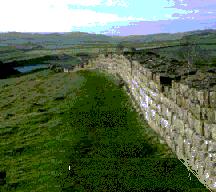 This
is alternatively called Brythonic, as is also named the subgroup of modern
Celtic languages, the tongues or speech of those Celts who inhabited England
before Anglo-Saxons came to the larger of the British Isles. Those who
settled in Ireland and further conquered Scotland were representatives
of the other, the Goidelic subgroup.
This
is alternatively called Brythonic, as is also named the subgroup of modern
Celtic languages, the tongues or speech of those Celts who inhabited England
before Anglo-Saxons came to the larger of the British Isles. Those who
settled in Ireland and further conquered Scotland were representatives
of the other, the Goidelic subgroup.
Celts had invaded these islands in the 8th century B.C. and soon assimilated the aboriginal tribes, obviously non-Indoeuropean. Nevertheless, many think that pre-Celtic populations existed here much later than was at one time assumed and influenced Celtic tongues right up to the beginnings of the new, A.D. era, and that their influence caused the forming of initial mutations and other peculiarities of the Insular Celtic languages.
These British people spoke a language which was not greatly different from Continental Celtic tongues, Gaulish and others. Their way of life was also quite similar, so that by the time Romans had landed on the island in the 1st century B.C. they were fully aware that Britons and Gauls were closely related. But while the language of the former had been evolving, changes did occur.
British phonetics developed some new vowels from Common Celtic, among which the sound [], absent in all other Celtic tongues, is the most significant one. Diphthongs tend to disappear here, turning into simple vowels. The Proto-Indoeuropean *w, which came into Irish as f, here is represented mostly by gw, which is seen today in Welsh. It now looks as though lenitions, nasalizations and other sandhi appeared in British along with its Goidelic counterpart in the 4th - 7th centuries A.D. and from British these were bequeathed to its later heirs: Welsh, Cornish, Breton.
In the 6th century Angles, Saxons and Jutes invaded the island, and
after a long and severe struggle Britons were pushed back into Wales and
Cornwall, from which some of them left for Brittany, back to the continent.
The language broke up into three separate groups, two of them remaining
in existence at the present time.